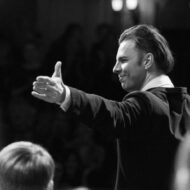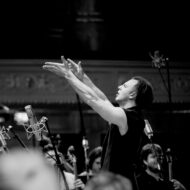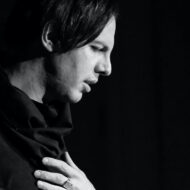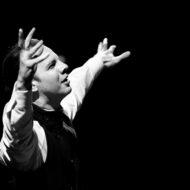Teodor Currentzis
Художественный руководитель
Краткое описание
Events
György Kurtág (b. 1926)
Songs of Despair and Sorrow for mixed choir with instrumental accompaniment, Op. 18 (1980–1994)
So weary, so wretched to the words of Mikhail Lermontov (1840)
Night, an empty street, a lamp, a drug-store to the words of Alexander Blok (1912)
Blue Evening to the words of Sergei Yesenin (1925)
Where can I go to in this January? to the words of Osip Mandelstam (1937)
The Crucifixion to the words of Anna Akhmatova (1939)
It’s time to the words of Marina Tsvetaeva (1941)
Grabstein für Stephan | Gravestone for Stephan for guitar and instrumental ensemble, Op. 15c
(1989)
Johannes Brahms (1833–1897)
Ein deutsches Requiem | A German Requiem for soprano, baritone, choir and orchestra, Op. 45 (1865–1869)
Selig sind, die da Leid tragen | Blessed are those who weep, for they will be comforted
Denn alles Fleisch, es ist wie Gras | For all flesh is like grass
Herr, lehre doch mich, dass ein Ende mit mir haben muss | Lord, teach me that I must have an end
Wie lieblich sind Deine Wohnungen, Herr Zebaoth! | How lovely is Thy dwelling place, O Lord of hosts!
Ihr habt nun Traurigkeit | Ye now therefore have sorrow
Denn wir haben hier keine bleibende Statt | For here we have no continuing city
Selig sind die Toten, die in dem Herrn sterben | Blessed are the dead who die in the Lord
The programme is subject to change.
Performers:
Iveta Simonyan — soprano
Vladislav Chizhov — baritone
The musicAeterna Choir and Orchestra
Conductor — Teodor Currentzis
György Kurtág (b. 1926)
Songs of Despair and Sorrow for mixed choir with instrumental accompaniment, Op. 18 (1980–1994)
So weary, so wretched to the words of Mikhail Lermontov (1840)
Night, an empty street, a lamp, a drug-store to the words of Alexander Blok (1912)
Blue Evening to the words of Sergei Yesenin (1925)
Where can I go to in this January? to the words of Osip Mandelstam (1937)
The Crucifixion to the words of Anna Akhmatova (1939)
It’s time to the words of Marina Tsvetaeva (1941)
Grabstein für Stephan | Gravestone for Stephan for guitar and instrumental ensemble, Op. 15c
(1989)
Johannes Brahms (1833–1897)
Ein deutsches Requiem | A German Requiem for soprano, baritone, choir and orchestra, Op. 45 (1865–1869)
Selig sind, die da Leid tragen | Blessed are those who weep, for they will be comforted
Denn alles Fleisch, es ist wie Gras | For all flesh is like grass
Herr, lehre doch mich, dass ein Ende mit mir haben muss | Lord, teach me that I must have an end
Wie lieblich sind Deine Wohnungen, Herr Zebaoth! | How lovely is Thy dwelling place, O Lord of hosts!
Ihr habt nun Traurigkeit | Ye now therefore have sorrow
Denn wir haben hier keine bleibende Statt | For here we have no continuing city
Selig sind die Toten, die in dem Herrn sterben | Blessed are the dead who die in the Lord
The programme is subject to change.
Performers:
Iveta Simonyan — soprano
Vladislav Chizhov — baritone
The musicAeterna Choir and Orchestra
Conductor — Teodor Currentzis



